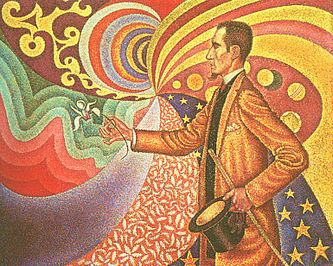…At his trial Emile Henry explained with some pride how he had constructed his bomb according to approved scientific principles and had methodically rehearsed his crime. he was less articulate about why he had picked that particular target. The Cafe terminus was not maxim’s, a symbol of the brazenly flaunted luxury of the people’s exploiters. It specialized in offering “good” music- the orchestra was playing Vincent d’Indy when Henry’s bomb went off- to modestly paid white collar workers seeking culture.

—Félix Fénéon
(1861-1944)
French art critic, novelist, anarchist
A friend of Seurat, Paul Signac, Théo van Rysselberghe, Henri-Edmond Cross, Andre Gide, et al.
A kind of cultural “terrorist” who may have been involved in terrorist acts of a less literary nature (one biographer claims he actually bombed a restaurant).—click image for source…
From the contempt in Henry’s voice it was evident that he despised his victims’ musical taste and cultural pretensions, but if he was indulging the whim of a secret tyrant by his act, it was the whim of a Torquemada rather than that of a Nero.
Exemplary punishment seems to have been Henry’s aim- punishment for the crime of collaborating with a hateful system by submitting to exploitation and for trying to console oneself with the small pleasures that the exploiters allowed their slaves. His only regret, he said, was that there were not more dead. “But those were innocent victims that you struck!” one of the three judges exclaimed. Henry’s reply explicitly formulated for the first time in modern terrorist annals the typically paranoid dogma of collective guilt that is now regularly invoked in order to justify indiscriminate or absurdist acts of terrorism: “There are no innocent victims.” ; an irony of atheism as religion that mirrored Catholic dogma of being born in sin.
ADDENDUM:
Emile Henry: Everything I saw revolted me, and my intelligence was attracted by criticism of the existing social organization. Such criticism has been made too often for me to repeat it. It is enough to say that I became the enemy of a society that I judged to be criminal.
Drawn at first to socialism, I was not slow in separating myself from that party. I have too much love of freedom, too much respect for individual initiative, too much repugnance for military organization, to assume a number in the ordered army of the fourth estate. Besides, I realized that basically socialism changes nothing in the existing order. It maintains the principle of authority, and, whatever self-styled free-thinkers may say about it, that principle is no more than the antiquated survival of faith in a superior power.
Scientific studies gradually made me aware of the play of natural forces in the universe. I became materialist and atheist; I came to realize that modern science discards the hypothesis of God, of which it has no need. In the same way, religious and authoritarian morality, which are based on false assumptions, should be allowed to disappear. What then, I asked myself, was the new morality in harmony with the laws of nature that might regenerate the old world and give birth to a happy humanity?
It was at this moment that I came into contact with a group of anarchist comrades whom I consider, even today, among the best I have ever known. The character of these men immediately captivated me. I discerned in them a great sincerity, a total frankness, a searching distrust of all prejudices, and I wanted to understand the idea that produced men so different from anyone I had encountered up to that point.
The idea – as soon as I embraced it – found in my mind a soil completely prepared by observation and personal reflection to receive it. It merely gave precision to what already existed there in vague and wavering form. In my turn I became an anarchist.
I do not need to develop on this occasion the whole theory of anarchism. I merely wish to emphasize i
evolutionary aspect, the destructive and negative aspect that brings me here before you.At this moment of embittered struggle between the middle class and its enemies, I am almost tempted to say, with Souvarine in Germinal: ’All discussions about the future are criminal, since they hinder pure and simple destruction and slow down the march of the revolution…’
source:Source: Anarchist Encyclopedia;
From: Gazette des Tribunaux, 27-8 April 1894;
Translated: by George Woodcock.





 COMMENTS
COMMENTS